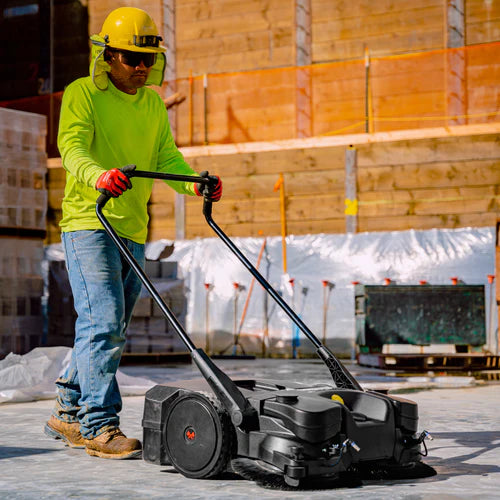Maintaining a clean and safe working environment is essential for any business, especially in industrial settings where dust, debris, and other pollutants are common. To achieve this, many companies turn to industrial battery sweepers, which are powerful machines designed to quickly and efficiently sweep floors and other surfaces.
One of the key features of many modern industrial battery sweepers is their dust suppression mechanism. This system helps to keep dust and other fine particles from becoming airborne during the sweeping process, reducing the risk of respiratory issues and other health problems for workers.
But how exactly does dust suppression work, and what are the benefits of this feature? In this blog post, we'll take a closer look at industrial battery sweepers and the importance of dust suppression in maintaining a clean and safe working environment.
How Industrial Battery Sweepers Work
Before we dive into the specifics of dust suppression, it's important to understand how industrial battery sweepers work. These machines are typically powered by rechargeable batteries, which provide the necessary power to the sweeping mechanisms.
Most industrial battery sweepers use a combination of brushes, vacuum systems, and filters to pick up dirt, debris, and other materials from floors and other surfaces. The brushes agitate the dirt and debris, while the vacuum and filter systems suck up the material and trap it inside the machine.
Dust Suppression Mechanisms
While industrial battery sweepers are highly effective at picking up dirt and debris, they can also generate a significant amount of dust and other fine particles during the sweeping process. This is where dust suppression mechanisms come into play.
Dust suppression systems typically use a combination of water and/or specialized chemicals to keep dust from becoming airborne. Some industrial battery sweepers use a wet sweeping method, in which water is sprayed onto the surface being swept to help trap dust and debris.
Other sweepers use a dry dust suppression system, which uses a specialized chemical to help keep dust particles from becoming airborne. These systems can be highly effective at reducing the amount of dust generated during the sweeping process, making it safer for workers and reducing the risk of respiratory problems.
Benefits of Dust Suppression
The benefits of dust suppression in industrial settings are numerous. Perhaps most importantly, dust suppression helps to protect workers from the harmful effects of dust and other fine particles. Breathing in these particles can cause a range of health problems, including respiratory issues, allergies, and even cancer in some cases.
By using an industrial battery sweeper with a dust suppression system, companies can significantly reduce the risk of these health problems for their workers. Additionally, dust suppression can help to maintain a cleaner working environment, reducing the need for additional cleaning and improving overall hygiene.
Another benefit of dust suppression is improved equipment longevity. Fine dust particles can be highly abrasive, which can cause damage to machinery and other equipment over time. By using an industrial battery sweeper with a dust suppression system, companies can help to extend the life of their equipment and reduce the need for costly repairs or replacements.
Industrial battery sweepers are an essential tool for maintaining a clean and safe working environment in many industries. By using a sweeper with a dust suppression mechanism, companies can significantly reduce the risk of respiratory problems and other health issues for their workers, as well as maintain cleaner facilities and extend the life of their equipment.










